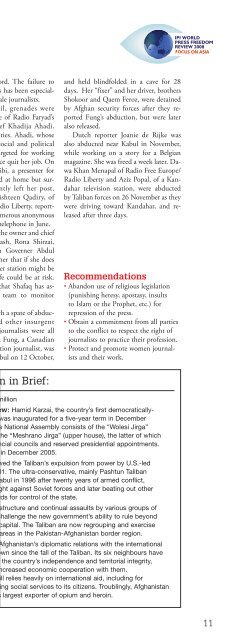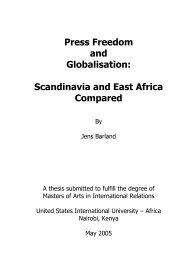FOcus On - International Press Institute
FOcus On - International Press Institute
FOcus On - International Press Institute
Create successful ePaper yourself
Turn your PDF publications into a flip-book with our unique Google optimized e-Paper software.
condemned on 26 June to four years in<br />
prison for “disturbing the social order.”<br />
Sun and his wife He Fang had been arrested<br />
in May 2007. According to Bo xun<br />
.com, Sun had been warned to stop repor -<br />
ting for Boxun.com. His wife re ceived a<br />
suspended sentence in a June trial.<br />
Chinese authorities barred<br />
foreign journalists from<br />
covering the unrest in Tibet<br />
Protests in Tibet that began in March<br />
to mark the anniversary of the failed<br />
1959 uprising against Chinese rule also<br />
brought retribution from the authorities.<br />
Paljor Norbu, 81, was sentenced to<br />
seven years in prison in November for<br />
printing the Tibetan flag and other prohibited<br />
material, according to Human<br />
Rights Watch. Details of the sentence<br />
were sketchy and the traditional printer’s<br />
family were not told of his whereabouts.<br />
Tibetan filmmaker Dhondup Wang -<br />
chen and cameraman Jigme Gyatso were<br />
detained in March after making a documentary<br />
about Tibet. The film, “Leaving<br />
Fear Behind,” includes interviews with<br />
Tibetan people on sensitive issues such as<br />
the Dalai Lama, the Beijing Olympic<br />
Games and Chinese rule over Tibet. The<br />
two sent their film abroad before being<br />
detained.<br />
Tibetan writer, singer and television<br />
presenter Rangjung was detained on 11<br />
September without charges. It is believed<br />
that his detention is in connection with<br />
his pro-Tibetan views expressed on his<br />
blog.<br />
Chinese authorities barred foreign<br />
journalists from covering the unrest in<br />
Tibet. Following international condemnation<br />
of the limits on foreign reporting,<br />
the Chinese government organised trips<br />
to the administrative capital of Lhasa for<br />
foreign correspondents. However, journalists<br />
who joined these trips were closely<br />
controlled. <strong>International</strong> radio stations<br />
broadcasting to Tibet were jammed and<br />
the Chinese authorities stepped up the<br />
censorship of incoming and outgoing<br />
Internet traffic.<br />
<strong>On</strong> 16 March, police prevented journalists<br />
with the US television network<br />
ABC from filming in a Tibetan district.<br />
Two days earlier, the American documentary<br />
filmmaker Spence Palermo was held<br />
in his hotel room to prevent him from<br />
A newspaper vendor sorts dailies featuring<br />
U.S. President-elect Barack Obama on<br />
their front pages at as news stand in<br />
Beijing, China, Thursday, Nov. 6, 2008.<br />
(AP Photo/Elizabeth Dalziel)<br />
seeing Tibetan protests, according to<br />
Reporters Without Borders (RSF). Jour -<br />
nalists were also barred from freely covering<br />
a small demonstration by Tibetan<br />
students held at Beijing University on 17<br />
March. Dozens of the demonstrators were<br />
arrested.<br />
Chastened by international criticism,<br />
Chinese authorities eased restrictions on<br />
foreign journalists covering the Olympics<br />
and on 17 October announced that the<br />
greater freedom granted ahead of the<br />
summer athletic events would continue.<br />
In practice, however, both foreign and do -<br />
mestic journalists continue to face steep<br />
hurdles – sometimes at their own peril.<br />
P.R. China in Brief<br />
Population: 1.3 billion<br />
Recommendations<br />
Release jailed journalists, cyber dissidents<br />
and other citizens imprisoned<br />
for distributing information or<br />
expressing their opinion.<br />
Bring Chinese laws and administrative<br />
practices in line with Article 35<br />
of the constitution, which states that<br />
“Citizens of the People’s Republic<br />
of China enjoy freedom of speech, of<br />
the press, of assembly, of association,<br />
of procession and of demonstration.”<br />
Respect journalists’ freedom to<br />
report on natural catastrophes and<br />
their aftermath as expressed in the<br />
resolution adopted by the 57th<br />
IPI General Assembly in Belgrade,<br />
Serbia, on 16 June 2008.<br />
Domestic Overview: China is a single-party socialist republic. Economic<br />
reforms called Socialism with Chinese Characteristics were started in<br />
1978 by pragmatists within the Communist Party led by Deng Xiaoping.<br />
These reforms eventually turned China into a global economic power<br />
and brought poverty down from 53% of the population in the Mao era<br />
to 12% in 1981 and only 6% of the population by 2001, according to the<br />
World Bank.<br />
Beyond Borders: China has worked hard to burnish its international relations<br />
and image since the Tiananmen Square crackdown in 1989. Its economic<br />
power makes it an indispensable partner despite its human rights policies,<br />
while its economic influence is expanding rapidly in Africa and Latin America.<br />
23
















